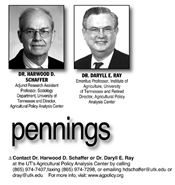|
Rural/Urban Divide On Environmental Policies

As we were growing up, Soil Stewardship Sunday was a regular part of the church calendar, landing on the last Sunday of April as farmers were in the midst of Spring planting. The bulletin cover or the bulletin insert was provided by the National Association of Conservation Districts (https://tinyurl.com/tbyec65) as was the material that the pastor often used as the basis of that Sunday’s sermon.
Over the years the observation was extended to include the week between the last Sunday in April and the first Sunday in May and is now called Stewardship Week. The focus was enlarged as well to include the whole environment – land, water, air, and the multitude of life forms that sustain all of life. This year the theme is “Where would we BEE without Pollinators?”
In reading “Understanding Rural Attitudes Toward the Environment and Conservation in America,” a publication of the Nicholas Institute for Environmental Policy Solutions at Duke University (https://tinyurl.com/tbzrbrj), we were reminded of the value of the work of groups like local Conservation Districts in shaping the views of rural and urban residents on the importance of care for the environment.
In their publication, Robert Smith, Emily Pechar Diamond, and Elizabeth Rowe point out that “while rural Americans express support for natural resource conservation, they and their elected officials often voice less support for existing federal environmental policies and laws.”
In laying out the basis of the study they conducted for their publication they ask: “Why do rural voters and their representatives often oppose environmental regulations? What accounts for this apparent rural/urban divide on attitudes toward environmental policy? Are there alternative policies, communications strategies, or, more broadly, ways to engage rural voters and constituencies that might bridge the urban/rural divide on the environment?”
For the most part, both rural and urban residents are equally concerned about the environment though their priorities are slightly different. The biggest difference, however, concerns the role of the federal government in setting environmental policy. Urban residents envision the federal government playing a more robust role than rural residents. By a significant margin, rural residents express a preference for action being taken by state and local governments where they feel they have a greater voice than they do at the national level.
One of the conclusions that we found interesting was the greater trust that rural residents have for conservation groups compared to environmental advocacy groups. In part, the authors found that rural residents felt that conservation groups like Nature Conservancy worked more closely with them than advocacy groups like the Sierra Club and the National Resources Defense Council.
The sources of environmental information that the study’s participants most trusted were local farmers/ranchers, biologists/scientists at universities in their state, and government agencies like the Fish/Wildlife Service.
We were not surprised to read that the study found that urban residents were more concerned about “climate change” than rural residents, though some of the difference they found was a matter of semantics. Rural residents tended to talk in terms of climate variability and unpredictable weather patterns. They also feel isolated from the national discussion on climate policy.
The authors conclude their report writing, “We would argue…that emphasizing successes may be a worthy strategy to build trust in environmental policies and agencies. An investment in finding voices in rural communities who can point to successful policy interventions – ones that work for both rural communities and the environment – might, over the long term, diminish skepticism toward the government’s actions on the environment that was so prevalent among rural voters in our study.” ∆
DR. HARWOOD D. SCHAFFER: Adjunct Research Assistant Professor, Sociology Department, University of Tennessee and Director, Agricultural Policy Analysis Center
DR. DARYLL E. RAY: Emeritus Professor, Institute of Agriculture, University of Tennessee and Retired Director, Agricultural Policy Analysis Center
|
|